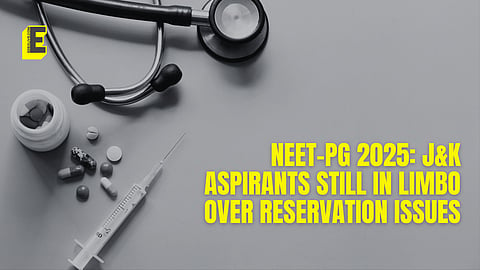

As the National Eligibility cum Entrance Test - Postgraduate (NEET-PG) 2025 approaches, medical aspirants in Jammu and Kashmir (J&K) find themselves grappling with uncertainty and frustration over the state’s revised reservation policies, which have drastically reduced Open Merit (OM) seats.
Despite months of protests and opposition from students and medical associations, the state government has yet to address their concerns, leaving many aspiring doctors anxious about their future.
The controversy surrounding NEET-PG admissions in J&K traces back to March 15, 2024, when the Lieutenant Governor-led administration amended the Jammu & Kashmir Reservation Rules, 2005. This policy change significantly reduced Open Merit seats in both education and government jobs, triggering widespread discontent among students.
Previously, 38.5 per cent of postgraduate medical seats were allocated to Open Merit candidates. However, under the new reservation framework, this quota has been slashed to just 26.6 per cent.
"In 2024, out of 293 government PG seats, only 78 were allotted to OM candidates. This is a huge setback for meritorious students who have dedicated years to their studies, only to find themselves sidelined by an unfair system," said Dr Saquib Jan, a NEET-PG 2025 aspirant.
He further highlighted instances where high-ranking candidates were denied specialty seats due to disproportionate reservation allocations.
"A candidate with a five-digit NEET-PG rank secured MD Radiology in SKIMS (Sher-i-Kashmir Institute of Medical Sciences), while another with a three-digit rank could not get the same seat. How is this fair? Specialty branches like Radiology, Medicine, and Surgery demand the best talent, yet merit is being ignored," he added.
Many local youth have been calling for a revision of the reservation policy, pointing that nearly 70 per cent of J&K's population belongs to the unreserved category, while only about 30 per cent come from reserved backgrounds.
Medical students argue that the revised reservation policy not only limits opportunities for meritorious candidates but could also impact the overall quality of healthcare in the state.
"If admission to specialty branches is not strictly merit-based, we risk placing less competent doctors in fields that demand exceptional skill. This isn’t just about students — it directly affects the fundamental right to quality healthcare for every citizen," said Dr Saquib.
A major point of contention is Rule-17, a policy unique to J&K that is not followed by any other state in India. Under this rule, if a reserved category candidate secures admission through the Open Merit quota and later upgrades to a better seat within their category, the vacated OM seat does not return to the general pool — it gets reassigned to the reserved category.
Dr Saquib criticised this provision, calling it an "unjust and unconstitutional loophole."
"Rule-17 creates a double disadvantage for Open Merit candidates. If a reserved category student secures an OM seat and later upgrades, that seat should go back to the general pool. But here, it is reassigned within the reserved category itself. This is outright discrimination against merit," he asserted.
With only 580 total PG medical seats, J&K already ranks among the lowest in India in terms of postgraduate medical education opportunities. The absence of private medical colleges and central-level institutes further exacerbates the issue, leaving students with limited options.
"States like Karnataka and Maharashtra have numerous private colleges where Open Merit candidates can compete fairly. In J&K, we lack such opportunities, and now even government college seats are vanishing under excessive reservation policies," added Dr Saquib.
For months, medical aspirants in J&K have been demanding the reinstatement of SRO-49, a 2018 policy that reserved 75 per cent of specialty seats for Open Merit candidates, ensuring a better balance between merit and reservation.
"SRO-49 safeguarded merit while maintaining reservation. Bringing it back is the only way to restore fairness in medical admissions," Dr Saquib emphasised.
The Jammu and Kashmir Medical Students Association (JKMSA) also stressed that ongoing uncertainty over SRO-49 and Rule-17 is causing undue stress among students.
"With NEET-PG 2025 approaching, aspirants are left in limbo. We urge the government to provide clarity on these issues so that hardworking doctors do not lose another year due to administrative delays," JKMSA stated.
Amid rising frustration, a Cabinet Sub-Committee was formed in December 2024 to address these concerns. The committee includes Education Minister Sakina Itto, Public Health Engineering Minister Javed Rana, and Minister for Food, Civil Supplies & Consumer Affairs Satish Sharma.
Furthermore, the office of Chief Minister Omar Abdullah recently assured students that the government is "actively working" on revising the state’s reservation policy and addressing student grievances.
However, with NEET-PG 2025 just months away, medical aspirants and student associations continue to await concrete action from the J&K government.
